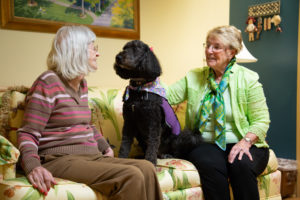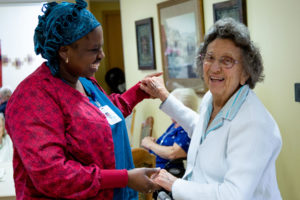Tips for visiting a loved one with Alzheimer’s
 Know what to expect
Know what to expect
Increase the likelihood of a positive visit by setting realistic expectations. The middle stages of dementia can be difficult. Sometimes Alzheimer’s patients experience challenging behaviors such as delusions or anxiety, or become easily upset. They might not recognize you right away or remember your name. Knowing that these symptoms are part of the disease, and not a reflection of the person’s relationship with you, can help you to respond well and ensure that the visit is positive.
Prepare
Before a visit, determine three things your loved one enjoys discussing. Maybe it’s a hobby such as fishing, a former teaching job or grandchildren. If the conversation has slowed, you will be prepared to switch topics.
Introduce yourself
Maybe you think it should be obvious that you’re his or her favorite niece, but your loved one might not be able to place you – which can be distressing for both you and the elder. Save him or her the possible embarrassment or awkward moment by introducing yourself right away.
Be respectful
Although your loved one’s memory is not what it used to be, don’t talk down or treat him or her like a child instead of an adult who has many life experiences. In the midst of confusion, it is important to make sure your respect is conveyed.
Minimize distractions
If the room you’re visiting is noisy or busy, ask if your loved one would like to go outside or down the hall for a quiet walk. You’re more likely to have a clear conversation with fewer distractions.
Use clear statements and avoid slang
Communicating with a loved one who has dementia is usually more effective with concrete statements or questions, rather than abstract language or slang terms. For example, rather than saying, “It’s no use crying over spilled milk,” say, “It’s okay, Aunt Sarah. That happened a little while ago and it’s just fine now.”
Don’t ask too many questions
Your loved one’s short-term memory might not be fully intact for recent events. Don’t ask questions that relate to recent items, such as what he or she ate for lunch or the last time someone visited.
Expect good days and bad days
Don’t be surprised if one day is different from the next each time you see your loved one. Early, or mild, dementia can vary quite a bit. It’s possible you might not see any noticeable memory problems one day and more difficulties the next day.
Bring pictures to your visit
If you have pictures from years past, bring them along on your visit. Seeing photos from long ago can trigger memories that are stored in an Alzheimer-s patient’s long-term memory bank. Sometimes, people can recall specific names and events just by seeing a picture. Even if the response seems minimal, many individuals are reassured by seeing familiar photographs, and paging through an album can provide a guide for conversation. If you’ve had the privilege of knowing the person for a long time, reminisce by bringing up favorite memories from the past, which are great conversation starters and mood boosters.
 Focus on abilities, rather than impairments
Focus on abilities, rather than impairments
Although the elder’s memory may be declining, draw attention to remaining skills. If he or she is great at doing puzzles, bring one to work together. If your loved one’s gift is gardening, ask for tips on how to grow tomatoes. Seek out areas of strength and emphasize those topics. Provide lots of reassurances and distractions if the discussion becomes a struggle.
Sing
Not sure what to do when you’re visiting? Consider singing, especially if your loved one has always enjoyed music. If singing isn’t your thing, bring recorded songs to play. Music has the potential to stir memories and emotions, sometimes resulting in a person reciting all of the words to a song even when their ability to communicate has declined.
Don’t argue
Arguing with someone who has dementia is rarely beneficial, and you will accomplish very little by disagreeing. When your loved one insists that it’s Tuesday on a Monday, your best bet is to go with the flow. Arguing will likely increase agitation and frustration. While visiting, enter the patient’s reality. If your loved one has paranoia or delusions, don’t try to convince them that what they’re hearing or seeing isn’t real.
Remember that emotion often lasts longer than memory
Research has demonstrated that it’s not just the memory that matters with Alzheimer’s patients; it’s also the emotion created by a positive visit, which can last much longer than the specific memory of that visit. You may have impacted that person’s whole day by changing their feelings and behavior. Although the patient might not recall that you visited, the feelings you created can change how they interact with others and improve their mood. Next time you think it doesn’t matter, think again. The benefit of your visit might last long after you’ve gone.
If you feel as if you’re having to work too hard at the conversation, simply sitting quietly together may be more than enough. If the person you are visiting seems to be growing agitated, gently say your good-byes and leave. Sometimes a 15- to 20-minute visit is all someone with dementia can tolerate.
Read more: Visiting Someone With Alzheimer’s: Easy Tips For a Rewarding Visit





